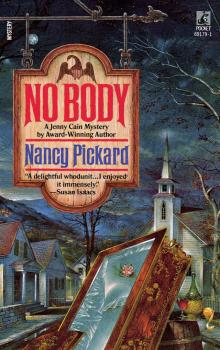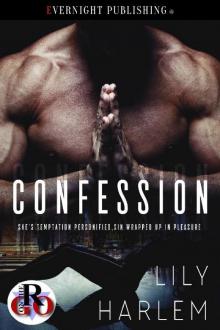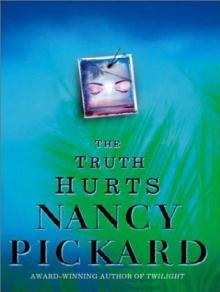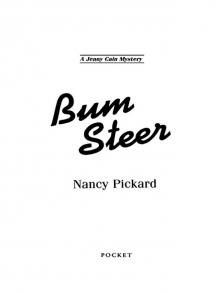- Home
- Nancy Pickard
The Truth Hurts Page 2
The Truth Hurts Read online
Page 2
As if he’d read James’s mind, the driver suddenly said, “I’m sorry we couldn’t stop to let you clean up. You must feel like shit.”
“I smell like it,” James mumbled.
He saw the man beside him smile in the darkness.
“If you can stand to wait,” the driver continued, “there’s a place up ahead where it’ll be safe to pull in long enough for you to shower and they’ll give you clean clothing.”
“I can stand it,” he made himself say, in spite of his resistance to talking to them, “if you guys can.”
They laughed at that, too hard, too loud, from too much tension.
James felt the mood shift in the Plymouth then. There was a thaw, a sense that they were all in this together, whatever “this” was. James was pretty sure that he knew exactly what it was. Black people who persisted in trying to obtain their right to vote—their right to anything—tended to end up in jail, and when they got out they then tended to end up beaten, burned, hung, and dead. Especially young black men labeled “troublemakers,” like him.
They introduced themselves to him. “I’m Marty Wiegan,” the man next to him said, and then Wiegan pointed to the driver. “That’s Austin Reese.” He pointed to the man riding shotgun. “And he’s Lackley Goodwin.”
He committed a little something about each of them to memory. Marty Wiegan had thin black hair pulled in strands across his scalp. Austin Reese wore aviator glasses. Lackley Goodwin was fat. When he turned around to look out the rear window he saw a parking sticker for Jim Forrest College on the window. They didn’t look old enough to have kids in college there. Did oneof them work there? That made him nervous all over again, because the school’s slogan was “Segregation Now, Segregation Forever.” What was somebody who worked for Jim Forrest College doing giving him a ride from jail?
“We have a house for you to go to,” the fat man riding shotgun, Lackley Goodwin, told him while continuing to keep an eye on the scenery. “I’m sorry we can’t tell you where. In case we get stopped, it’s safer if you don’t know much. As far as you know, we’re just three crazy strangers giving you a ride home from jail.”
“My home’s not this way,” he told the men.
Apparently, they knew that. They didn’t bother to answer.
“How was it, in jail this time?” the man beside him, Marty Wiegan, asked in a quiet, respectful tone of voice.
They knew a little something about him, then, if they knew it was a “this time.” James turned his face to the window and shook his head, staring out at the trees racing past. He almost didn’t answer, because it was such a stupid question. What did they think it was like this time, or any time? Did he have to explain the word badto them? Did he need to establish a whole new standard of horror for these white people?
“Bad,” he muttered.
“We only ask,” Wiegan said, with an apologetic air, “because we have to document this stuff. I’m sorry to ask you to talk about it, but we have to know, so we can inform the lawyers, so we have specifics to protest, facts to file, you know how it is.”
He didn’t, didn’t know about that end of it, because nobody had ever asked him before now. He only knew about anger and fear, action and reaction. Sometimes—most of the time—he didn’t really believe anything would change. He tended to join marches and voter registrationdrives out of a burning driving resentment more than anything else, and not because he believed any good might come out of it. In fact, only bad had come out of it for him up to now. Only pain, bruises, broken bones, indignity, disrespect, humiliation, failure, degradation, starvation in jail cells, and the impoverishment of somebody who spent too much time being angry and getting thrown in jail to be able to hold down a job. But it wasn’t as if he had any real job prospects in the world anyway. As long ago as when he was thirteen—five long years before this—he had decided that if the choice was between being a tenant farmer, which was tantamount to slavery, or being an “activist,” he might as well lay his life down for something more than a few acres of dirt that he’d never own outright.
For the next few miles, in a dry voice, without embellishing anything, James told them how it had been in jail “this time.” Marty Wiegan wrote it all down in a spiral-bound notebook and asked him to sign it, which he did, thinking, What the hell, if they don’t kill me for this, they’ll get me for something else. As he explained things to them, they didn’t say a word, not even a murmur at the worst parts. But he thought he saw shame and pain on their faces—he recognized it because he had seen it every day in the mirror—and that was a revelation, too.
They were approaching a town—a mere pause in the road with only four or five houses—and the driver slowed the car, as if he were going to stop at one of them. But the shotgun passenger said urgently, “There’s a truck around to the side. I don’t know whose it is. Keep going. Don’t stop!”
They held their breaths as they passed the small frame house with its lights on and an old green pickup truck parked in the shadow of it. Frightened into silence again,they kept on driving through the night. The truck didn’t follow them, but they kept on going anyway.
“Just go on to the Folletinos,” the shotgun passenger finally advised in a quiet voice that wasn’t meant to carry over into the backseat, where James heard it, too.
It was the only hint he got of his destination.
2
Marie
Somehow I manage to exit the Publix store, find my way to my car, and collapse into the driver’s seat without having hysterics.
“I’m not going to cry.”
That would be stupid. This was bound to happen someday. Today The Insider, tomorrow what? People? The Sunday book review of the New York Times? I can see it all now—an in-depth analysis of all my books, looking for clues to my past, to my psyche. Well, good luck to them! I’ve never had much luck following those clues to myself.
“Calm down.”
I’m already overreacting; tears would only drown the lily. This is not like me, to panic. I’m not going to race back in and purchase every copy of the damned tabloid in order to keep anybody else from seeing it, although God knows, I want to. But I can’t buy all of them in south Florida, much less the whole state, or New York City, where my publisher is, or the rest of the world, where my books are sold. And I’m not going to—
I don’t know what else I’m not going to do.
Thinking straight, that’s apparently one of the things I’m not going to do for a while longer.
What I’m going to do is force myself to open the tabloid, The Insider, and read what it says about me. “Read it,” I command myself. “It’s just a stupid tabloid story. It can’t hurt you.” Oh yeah? The problem here is that I’m really frightened and full of dread of the unknown, and what I really feel like doing is opening my car door and throwing up.
“Read it!”
I pull the newspaper from the grocery bag and prop it against my steering wheel. My hands are shaking. How interesting. Okay, here it is—the article, with a headline that makes me want to ball this paper up and then rip it to pieces.
MARIE LIGHTFOOT HIDES RACIST PAST
“Damn you, damn you, damn you!”
Underneath that, it says, in the tabloid style of short sentences, unattributed quotes, and lots of exclamation marks,
Marie Lightfoot is famous for ripping the covers off other people’s lives in her best-selling books. But in an exclusive Insider story, we have just learned she is a stranger to the truth when it comes to her own life!
I’d laugh at the style if it weren’t for the substance.
In fact, Lightfoot is not even her real name, sources tell us.
Sources? What sources? Who? The “why” is easy enough to guess—at the bottom of each page there’s a notice saying “Cash for Tips!” and an 800 number for tattlers. It appears that somebody has betrayed me for $500, or more.
The real name of the popular author of The Little Mermaid is Marie Folletino. Informed sources tell T
he Insider that she is the only child of well-known segregationists from Alabama!
“They were racists of the very worst sort!” our sources tell The Insider. “They belonged to the KKK, and worse!”
Rumors. Only rumors. Unproved rumors.
And there’s more!
I was afraid there might be.
Both of her parents mysteriously disappeared on June 12, 1963!
They have never been heard from since! Foul play is definitely suspected. But Marie has never divulged THIS true crime to her readers, even going so far as to change her name legally from Folletino to Lightfoot.
And now even her handsome boyfriend, a popular and respected Afro-American prosecutor in Florida, knows the terrible truth about his famous lover.
“His family is furious,” sources tell The Insider. “It breaks his children’s hearts to know their father is dating a woman from that kind of family!”
Like most sentences in tabloids, this one is ambiguously close enough to a truth to be un-actionable. I don’t think that anybody in Franklin’s family knows about my family history, but it is certainly true that his ex-wife is “furious” that he’s dating me, and his parents aren’t thrilled that I’m from “that kind of family.” In their lexicon that means “white.” As for “his children’s hearts,” it’s only his six-year-old daughter who dislikes me, not his three-year-old son, but I wouldn’t go so far as to say it breaks her heart. At least, I hope not. That would break my heart. Did somebody from this rag actually talk to one of the DeWeeses, or did they just make this up, assuming they could link it to some kind of truth?
It hardly matters now. If there’s damage, it’s been done.
Maybe the worst of it is how they’ve trivialized my life.
My God, I hope I’ve never treated any of the people in my books like this. I hope I’ve never made innocent people feel as I do at this moment. I hope I’ve treated them sympathetically, allowed them to continue to hold their heads up even after my books came out. There’s no sympathy in this article for the child I used to be, no respect for the woman she became.
The Insider says: this is a woman who writes books about the lies and crimes in other people’s lives. Now will she have the decency to face the public with the truth about her own ?
Decency? Why didn’t these people have the decency to call me first?
“What is she hiding ?” our sources want to know.
Why would anybody care?
We want to know, too! Will you tell your readers the truth NOW, Marie ?
Why should I? Even if I knew the whole truth, which I don’t.
“What a hypocrite! If she can lie for so many years about her own story,” said a former fan, “then how can we trust her to tell the truth in her books ? If she couldn’t even tell the truth to her own boyfriend, when does she ever tell it to anybody ?”
Oh, please.
“I’ll never buy one of her books again!” said the former fan.
How very convenient that they located an anonymous fan. I wonder if that might be one of their own editors?
Let us know what YOU think!
E-mail, call, or write to The Insider today!
That’s it. But now I don’t know whether to laugh or cry. It looks so ridiculous, written like that. Surely any halfway intelligent person who reads it will have to wonder if they made it all up. But that won’t help with the people who aren’t halfway intelligent. And it won’t stop the story from spreading. It won’t stop rumors. It won’t stop my name from being linked with the damning word racist. It won’t stop people from hearing those rumors and believing them and deciding I’m a horrible person and they don’t want to read me anymore. And if enough people decide I’m despicable and they stop buying my books, then my publisher won’t want to publish me anymore.
“Stop it,” I command myself. “Don’t get maudlin.”
But I can’t stop people from seeing this, and I can’t stop the story from being almost true. I’ve written down some of it, the parts I think I know from questions I’ve asked of people over the years. I’ve even given it a title— Betrayal —in case I ever gather enough material to finish a book about it. I’ve got the beginning of it, the part I like, the part that could fool a person into thinking that Michael and Lyda Folletino were decent people.
It’s the ending—their ending—that eludes me.
A man named “James” was witness to part of it.
When I met him, “James” was only one on a list of several names that I’d compiled of people who might be able to talk about my parents. By the time I tracked him down he was fifty-two years old, living in the North. He told me that he still wanted to be identified only as “James.” He was an attorney by then—in his expensive gray suit, he looked like one—and when I interviewed him, he called himself “a compromised man.”
“I used to be principled,” he told me. “I once was brave and young and foolish and desperate. I think I liked myself better when I was desperate. Sometimes, I wish I was still afraid to die.”
BETRAYAL
By Marie Lightfoot
—•—
CHAPTER TWO
June 11–12, 1963
Alabama
They sped on, scared, with few words among them.
Miles down the road, the white men told James to duck down again.
Sometime later, when he felt the car slow to a crawl and then begin a winding climb up a gravel road, the one riding shotgun said quietly, “When we stop, open the door on your side as quietly as you can, just enough to get out of the car. There will be a door to a house right beside you. It’s unlocked. Run in. That’ll be where you stay for a few days until it’s safe to take you north. When you get inside, don’t turn on a light. Close and lock the door. There will be a bathroom for you. Clothes. Water. Food. Stay in there until someone comes to you in the morning. Oh, and unlock the door in the morning so they can get in.”
The one beside him muttered, “Good luck, James.”
The Plymouth stopped. Austin Reeves, the driver, said, “Go!”
Without another word, without pausing to thank them or even knowing if he should feel grateful—for who knew how this would end?—James did exactly as they directed him to do.
He found himself inside a bedroom. The only light slipped in around the drawn curtains at the window, and that derived from the moon. But he could see enough to tell it was all as they’d said it would be. There was a bottle of cool milk on a table under the window in the light of the moon, and he gulped it down like food. It was a few moments before he realized he hadn’t heard them drive away. He peeked out the window. They were gone, whoever they were. Wherever this was they’d brought him. In the single fast look he allowed himself, all he saw was a gravel driveway and a tree, a magnolia, its large, shiny leaves reflecting moonlight. But nothing about what he saw told him where he was. It could be anywhere, or at least that’s what he thought until he turned around again. He could make things out better in the darkness now.
No, James decided then, this couldn’t be “anywhere.” It was too nice, too grand for that. James had never been in a bedroom so nice. He’d never lived in a house with indoor plumbing, much less one with a bedroom with its own private toilet and bathtub and shower. For a dangerous instant, James wanted to laugh out loud, because he didn’t know if he could figure out how to make all the fancy white knobs work right in the bathroom.
When he ran water in the tub—figuring it out at the same time that he realized it didn’t take a genius to use inside plumbing—he nearly fainted when water pipes rattled and rumbled in telltale betrayal of his presence there. But the people who owned this house must know he was there, they must be on his side, he figured, and he relaxedenough to sink down into the first real tub bath of his eighteen years.
After that, he slept as if he had no worries but an empty stomach.
In the morning, he found food in the room, supplies that he hadn’t seen in the dark the night before when he’d
been so hungry he thought his stomach would keep him awake all night. Now he saw that in a corner there was a large tray of food covered by a dark cloth. There had been crackers there all along, salami, milk that was warm now, though he drank it anyway. There was bread and cheese that had gone dark orange from sitting out too long, but he ate that, too. There was even a cake—an entire chocolate two-layer cake with chocolate icing—and a basket of cold fried chicken and another one of biscuits that were still soft inside even if their crusts had gone rock hard. It was the best meal he’d ever eaten outside of his grandma’s Sunday dinner, and the only reason her meals took first place over this one was that he had sat around her table in safety and contentment. Here, he ate alone with his worry about what was going to happen to him next. This was operating like a modern-day underground railroad, he understood that much by this point. So he supposed they’d come for him and move him along to another safe place and then another until he could catch a train or a bus or hitch a ride up north.
It wasn’t safe for him down home anymore, not since this last arrest.

 The Scent of Rain and Lightning
The Scent of Rain and Lightning No Body
No Body The Secret Ingredient Murders: A Eugenia Potter Mystery
The Secret Ingredient Murders: A Eugenia Potter Mystery The 27-Ingredient Chili Con Carne Murders: A Eugenia Potter Mystery
The 27-Ingredient Chili Con Carne Murders: A Eugenia Potter Mystery Twilight
Twilight Marriage Is Murder
Marriage Is Murder I.O.U
I.O.U The Virgin of Small Plains
The Virgin of Small Plains Generous Death
Generous Death The Whole Truth
The Whole Truth The Blue Corn Murders
The Blue Corn Murders Say No to Murder
Say No to Murder Confession
Confession Dead Crazy
Dead Crazy The Truth Hurts
The Truth Hurts Bum Steer
Bum Steer